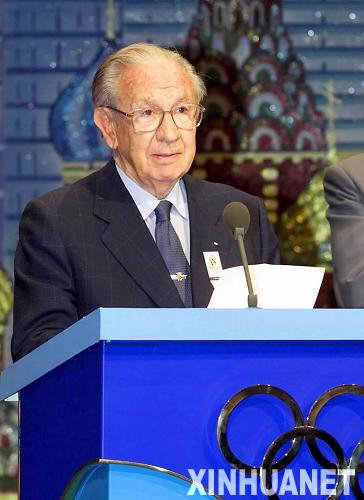Former IOC president Samaranch dies
Former International Olympic Committee president Juan Antonio Samaranch died in a hospital in Barcelona on Wednesday at the age of 89.
 |
|
File photo of Juan Antonio Samaranch |
Samaranch was hospitalized on Tuesday in "very critical condition" after suffering a heart attack.
He had been in intensive care in the Hospital Quiron in Barcelona.
IOC President Jacques Rogge hailed Samaranch's contribution to the Olympic movement, describing him as "a great man, a mentor and a friend who dedicated his long and fulfilled life to Olympism."
The IOC said in a statement on its official website that Samaranch was widely credited with renewing and fundamentally changing the landscape of the Olympic Movement.
"I cannot find the words to express the distress of the Olympic Family," said Rogge. "I am personally deeply saddened by the death of the man who built up the Olympic Games of the modern era, a man who inspired me, and whose knowledge of sport was truly exceptional."
Rogge added, "Thanks to his extraordinary vision and talent, Samaranch was the architect of a strong and unified Olympic Movement. I can only pay tribute to his tremendous achievements and legacy, and praise his genuine devotion to the Olympic Movement and its values. We have lost a great man, a mentor and a friend who dedicated his long and fulfilled life to Olympism.”
Born in Barcelona in 1920, Samaranch pursued a career as diplomat and sports administrator before leading the IOC for 21 years from 1980 to 2001.
Soon after his election, Samaranch worked towards the abolition of amateurism at the Olympic Games. Despite two boycotts in Moscow in 1980 and in Los Angeles in 1984, Samaranch managed to maintain the quality of the Games and increase the number of participating countries.
He was the man behind improving the financial health of the Olympic Movement, developing TV rights and sponsorship negotiations and strengthening Olympic Solidarity, the organ by which the IOC redistributes its revenue in order to ensure the training and participation of athletes at the Olympic Games.
The IOC said in the statement that Samaranch was responsible for the new IOC headquarters building in Vidy and for inaugurating The Olympic Museum in Lausanne. He also championed the representation of women in the IOC, overseeing the entry of the first women members in the 1980s.
He was likewise responsible for setting up the Court of Arbitration for Sport (CAS), and for involving the athletes themselves in the decision-making of the IOC by creating the IOC Athletes' Commission.
A diplomat, Samaranch started his career as Municipal Councillor responsible for sport in the City of Barcelona. He then took on the role of National Delegate for Physical Education and Sport before becoming President of the Barcelona Diputacion. He was appointed Spanish Ambassador to the former Soviet Union and the People's Republic of Mongolia from 1977 to 1980.
Before his election as IOC President in Moscow in 1980, Samaranch had a long career in sports administration. He was a member and subsequently President of the Spanish National Olympic Committee from 1967 to 1970; President of the Spanish Skating Federation; and Chef de Mission at the Olympic Games in Melbourne in 1956, in Rome in 1960 and in Tokyo in 1964. He was himself a keen rink hockey player.
The Spaniard, who was made honorary life president of the IOC on his retirement, has suffered from health problems since stepping down.
In September 2001 he spent 11 days in hospital with fatigue, while towards the end of last year he was admitted to intensive care in Monaco with difficulty breathing.
 0
0 






